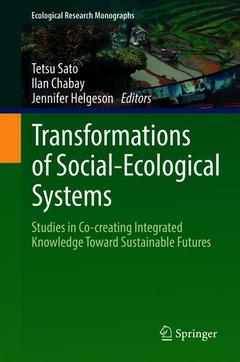Description
Transformations of Social-Ecological Systems, 1st ed. 2018
Studies in Co-creating Integrated Knowledge Toward Sustainable Futures
Ecological Research Monographs Series
Coordinators: Sato Tetsu, Chabay Ilan, Helgeson Jennifer
Language: English
Subjects for Transformations of Social-Ecological Systems:
Support: Print on demand
Description
/li>Contents
/li>Biography
/li>Comment
/li>
Through this book, readers will gain a comprehensive overview of transdisciplinary knowledge co-production in local contexts as an issue-driven and solution-oriented process, and will come to understand its relationship to societal transformation processes toward sustainability. In a single volume, the theory, approaches and academic implications of this novel type of knowledge production are addressed, together with its societal impacts.
In the midst of global anthropogenic impacts that affect various environments, over the past few decades we have observed autonomous initiatives in local communities around the world to tackle these environmental challenges. It is vital that such local actions be scaled up to achieve sustainable societies, which requires societal transformation on larger scales. Thanks to numerous collaborative actions in local communities, transdisciplinary knowledge co-production among diverse stakeholders has successfully been mobilized,resulting in the development of Integrated Local Environmental Knowledge (ILEK); knowledge that can inform and support decisions and actions promoting the sustainable transformation of society.
This book uses comparative case studies in communities around the world to illuminate and clarify processes and factors promoting the co-production and utilization of ILEK to facilitate decision-making. In addition, readers will gain deeper insights into the science-society interactions that can contribute to finding collaborative solutions to a wide range of critical environmental problems. Though the book is ideally suited for researchers and students, it also offers a valuable resource for practitioners, government agencies, and stakeholder agencies.
Tetsu Sato is professor emeritus at the Research Institute for Humanity and Nature, National Institutes for Humanities, Kyoto, Japan; professor at Ehime University, Matsuyama, Japan; and former project leader of the “Creation and Sustainable Governance of New Commons through Formation of Integrated Local Environmental Knowledge” (ILEK Project). His major research fields are sustainability science and transdisciplinary local environmental studies.
Prof. Sato studied the ecology of cichlid fishes of African lakes for 20 years, and expanded his research into adaptive governance of complex social-ecological systems. Throughout his career, including as conservation director of the WWF Japan and professor of Nagano University, he focused on creating knowledge bases for community-based management of natural resources. As the project leader of the ILEK project (from 2012 to 2017), he has explored a transdisciplinary approach to co-produce integrated local environmental knowledge (ILEK) as the knowledge basis for decision making and actions of diverse stakeholders for societal transformations toward sustainability. Since 2017, he has been leading a 3-year research project at Ehime University titled “Transdisciplinary Study of Natural Resource Management Under Poverty Conditions Collaborating with Vulnerable Sectors (TD-VULS project)”, funded by the Research Institute of Science and Technology for Society (RISTEX), Japan Science and Technology Agency.
Ilan Chabay is head of Strategic Science Initiatives and Programs and the KLASICA (Knowledge, Learning, and Societal Change International Research Alliance - www.KLASICA.org) project at the Institute for Advanced Sustainability Studies (IASS) in Potsdam, Germany; and adjunct professor in the School of Sustainability, Arizona State University at the ASU Barrett & O’Connor Center, Washington DC, USA. His major research fields are understanding social dynamics in complexsocial-ec
These books may interest you

Creating Low Carbon Cities 137.14 €

Creating Low Carbon Cities 137.14 €


